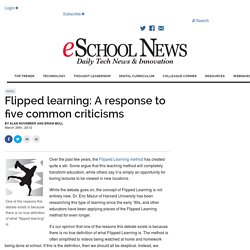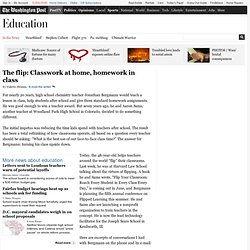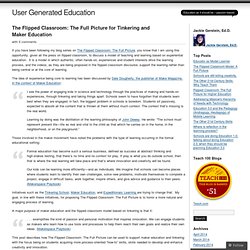

Flipped learning: A response to five common criticisms. One of the reasons this debate exists is because there is no true definition of what “flipped learning” is.

Over the past few years, the Flipped Learning method has created quite a stir. Some argue that this teaching method will completely transform education, while others say it is simply an opportunity for boring lectures to be viewed in new locations. While the debate goes on, the concept of Flipped Learning is not entirely new. Dr. Eric Mazur of Harvard University has been researching this type of learning since the early ’90s, and other educators have been applying pieces of the Flipped Learning method for even longer.
The flip: Classwork at home, homework in class. Today, the 48-year-old helps teachers around the world “flip” their classrooms.

Last week, he was at Harvard Law School talking about the virtues of flipping. A book he and Sams wrote, “Flip Your Classroom: Reach Every Student in Every Class Every Day,” is coming out in June, and Bergmann is planning the fifth annual conference on Flipped Learning this summer. He and Sams also are launching a nonprofit organization to train teachers in the concept. He is now the lead technology facilitator for the Joseph Sears School in Kenilworth, Ill.
Here are excerpts of conversations I had with Bergmann on the phone and by e-mail: Friday Institute for Educational Innovation - FIZZ. The Flipped Classroom: The Full Picture for Tinkering and Maker Education. If you have been following my blog series on The Flipped Classroom: The Full Picture, you know that I am using this opportunity, given all the press on flipped classroom, to discuss a model of teaching and learning based on experiential education.

It is a model in which authentic, often hands-on, experiences and student interests drive the learning process, and the videos, as they are being proposed in the flipped classroom discourse, support the learning rather than being central or at the core of learning. The idea of experience being core to learning has been discussed by Dale Dougherty, the publisher of Make Magazine, in the context of Maker Education: